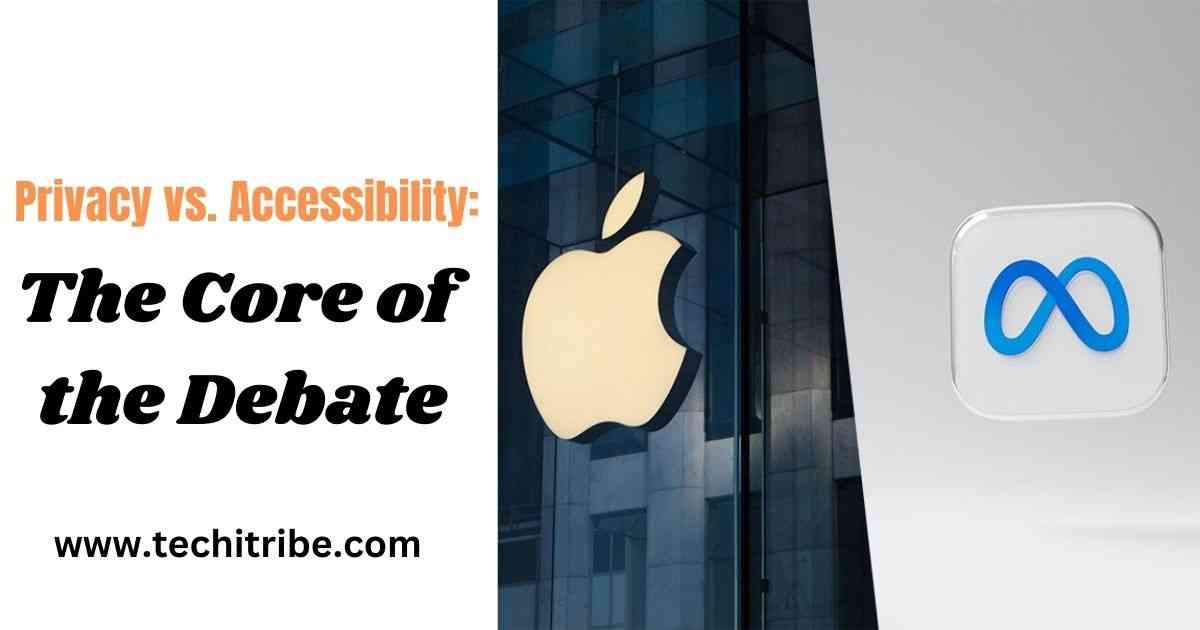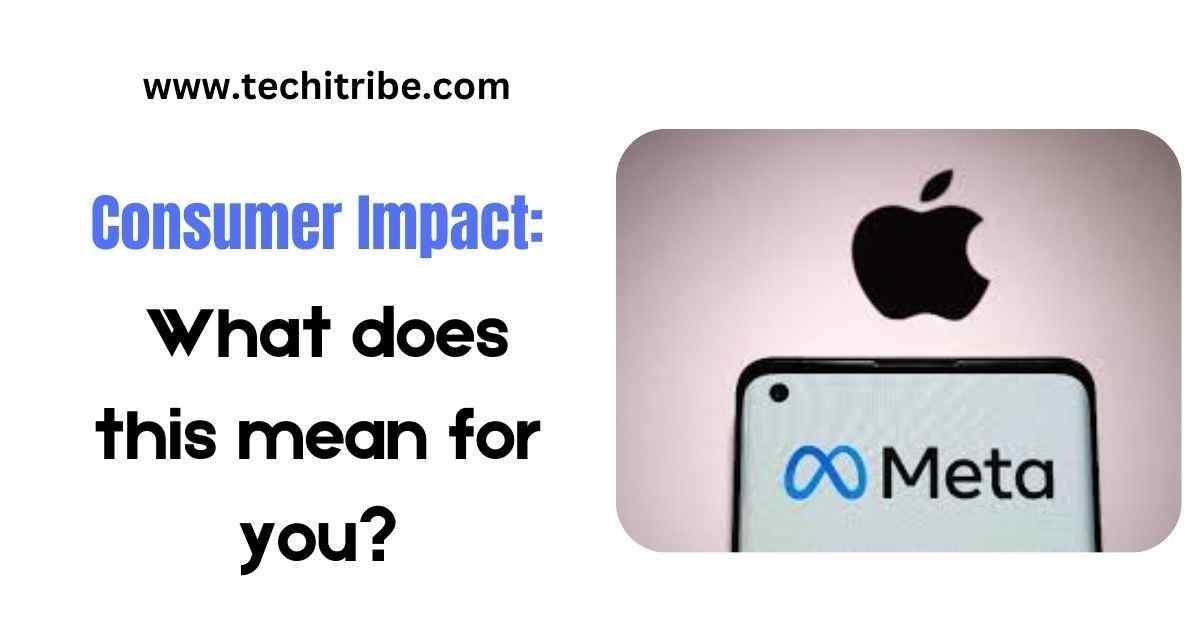Apple vs Meta, The latest stage in the ongoing tit for tat between tech titans Apple and Meta has been fascinating. As with many issues, the two firms have long been opposed on a variety of issues, but the new source of friction, this time on interoperability, has caused great excitement among the industry. The clash of the two giants sets their arguments to a series of crucial questions about privacy, innovation, and the new technologies to come. So I’m going to take you through what this means, why this matters, and what this might mean for the tech landscape.
Also visit this link: Legal Battle: Arm and Qualcomm Sued Ex-Apple Executive in Chip Design Dispute

So Is What Is Interoperability, and Why Is It Important?
Apple vs Meta, The ability for a range of systems, platforms, and devices to work and behave how needed, at least until desired, is what is termed interoperability. As the basic foundation of what users expect in a completely digitally connected world, that just says something about interoperability, which promises to let a user’s favorite app or other software run fluently between another device without any limitations imposed on it.
For companies like Meta, erstwhile Facebook, interoperability is central to the realization of a connected ecosystem—in particular, now that they are massively investing in the metaverse. Apple has never been an interoperable player. This company has always followed an approach that can be branded as walled garden-oriented, emphasizing user privacy with tight control over the very ecosystem.
For instance, interoperability can be the difference-maker in the users’ experience by eliminating such switch friction. Many more customers would love a uniform message system where conversations were effortlessly flowing across devices and other apps. But it all calls for critical concerns on privacy data, security, as well as corporate competition.
Meta’s Push for Open Systems, Apple vs Meta
Apple vs Meta, Meta has not been shy to announce its focus on building open systems that can form even deeper connections between platforms. In this regard, Meta’s CEO Mark Zuckerberg has continually underlined the need to break silos between apps and between devices. This reflects part of Meta’s mission that is more general and involves connecting and integrating its apps into everyday life for users in multiple ways.
It’s not just about ease, according to Meta, but a strategic play to get its services deeply implanted in ecosystems it doesn’t control. For instance, if WhatsApp works well with Apple’s iMessage or Instagram works natively with Apple’s Photos app, then it gives Meta access to the massive user base of Apple in ways no company has ever had.
This also works in line with Meta’s long-term goals within the metaverse. A premise of the metaverse is interconnected systems in which a user can easily move between virtual worlds and real-world platforms. Interoperability is not good; it is a requirement for the metaverse to truly take off.
Apple’s Tightly Knit Ecosystem: A Double-Edged Sword
Apple vs Meta, It would then ensure the experience of exclusiveness because, according to Apple, this enhanced user experience is offered with a product that seems so perfect. Its hardware and software optimize everything to function with its own products; thus, its approach ensures consistency and security of personal data from a user by sticking to its brand identity.
Walled Garden has apparent advantages. That first includes seam integration, to which devices and applications appear not to function improperly. As well, its mechanisms regarding protecting systems or equipment from malware and data intrusion due to proper controls in system access by apps are powerful.
However, critics argue that such a closed ecosystem has a limiting effect on competition and stifles innovation. In fact, Meta’s demand for more interoperability puts this model to question, whether Apple’s approach is too restrictive in an increasingly interconnected world. While the methods followed by Apple might be based on user security, it creates significant barriers for third-party developers and competing platforms.

Privacy vs. Accessibility: The Core of the Debate
Apple vs Meta, This intense battle inside the argument is to achieve either privacy or access. Apple has continually stated that the extreme position they are taking is purely being done in interest for users’ privacy. Interoperability with Meta’s services is likely to expose users to greater dangers of data sharing. Especially with the string of scandals about matters of privacy, this justifies Apple’s denial.
Meta, however, sees things differently. The company argues that Apple’s refusal to open up stifles competition and hurts consumers by creating unnecessary barriers. In this way, Apple limits the choice of users by controlling how apps interact with its ecosystem and locks people into proprietary services.
Many believe that the balance between privacy and accessibility is the key. Users want the best of both worlds: seamless functionality without compromising on security. However, achieving that balance remains a significant challenge, especially when trust in big tech companies is already fragile.
Regulatory Scrutiny Adds Fuel to the Fire, Apple vs Meta
Apple vs Meta, This interoperability debate is not in the vacuum. Apple and Meta are under constant scrutiny from the regulators of the world. The increasing antitrust cases against such large technology companies call for a level playing field and fair play.
But it will be a monopolistic action when Apple denies interoperability requests. The European Union and the United States have already criticized App Store practices by Apple and how the company strangles the mobile market. It will only gain more positive image when Apple allows more interoperability.
Open systems is a strategic play for Meta, which puts itself as the champion of consumer choice. Speaking about interoperability can make Meta espouse preference for consumer freedom even with the problems it has with regulators regarding privacy and misinformation.
The Role of the Metaverse, Apple vs Meta
Apple vs Meta, Its wide metaverse vision is one of the most important drivers for Meta’s push towards interoperability. In reality, the metaverse is a virtual universe where people can interact and work together as we play in an environment that employs connected systems. Interoperability with Apple devices would be the ultimate game-changer for Meta because it will increase its influence and coverage.
It is the free space where the users are allowed to move from one platform to another with ease. Whether it is attending a virtual meeting, playing a game, or socializing with friends, interoperability is what would create seamless experiences. The company risks being on the sidelines of the race that will define the metaverse if it resists Meta’s demands.
But Apple has secret plans for augmented and virtual reality. And the AR/VR headsets that have been rumored for ages by the tech giant are likely to become a direct competition over what Meta is offering.
Perhaps if the technology giant finds an isolated niche in the metaverse, it will never depend on interoperability for being dominant

Consumer Impact: What does this mean for you?
Apple vs Meta, At the heart of this debate are consumers. More interoperability would bring convenience because users would no longer have to juggle between ecosystems. It could be imagined that one might send a WhatsApp message directly to iMessage without leaving the application, or photos shared between Instagram and Photos on Apple’s device without hassle.
But perhaps it’s at the cost of the privacy and security of their data. The access this gives companies like Meta regarding user data raises so many questions over how user data will be handled. Meta has never had a great history about being private, and it makes sense why Apple may not open up its system to concerns over protection of its users.
On the other hand, Apple’s resistance to interoperability might frustrate a user who wants more versatility in the use of a device. For those persons relying on both Apple and Meta services, the missing integration is creating unnecessary frictions. The ultimate winners or losers will be determined by which companies do better in countering these consumer concerns while competition intensifies.
Conclusion and Future Trends, Apple vs Meta
Apple vs Meta, This fight embodies a wider trend across the tech sector. The new battleground in this fight involves interoperability becoming the crucial issue under which companies have to advance their ecosystems and, at the same time, keep users trusting them. The precedents set here might create a very significant aspect to the future cooperation of these tech giants.
Highly probable reasons would be regulatory pressures. The governments and watchers around the world are scrutinizing these big techs far more rigorously than before. Probably, it will be because of interoperability-pursuing policies and the curbing of monopolistic practices, which will turn the whole tide of the industry around.
In addition, blockchain and Web3 decentralized technologies can transform the notion of interoperability in a whole new way. Blockchain and Web3 are promising open systems controlled by users rather than depending on the good will of corporate giants. As these technologies spread further, one would be less likely to have a debate on which is better: Apple or Meta.
What’s Next?
The battle between Apple and Meta over interoperability is far from over. Both have compelling arguments, and the outcome will likely depend on what regulatory decisions, market trends, and evolving consumer expectations do at the end.
For now, this collision speaks to a much larger question: How do we balance innovation, competition, and privacy in a rapidly advancing digital age? The answers to these questions will shape not only the future of Apple and Meta but also the tech industry at large.
Final Thoughts
Apple vs Meta, It is not just about the battle of two companies: two giants fighting each other in the Apple-Meta interoperability debate. The controversy goes much deeper and is somewhat of a microcosm of the challenges facing this sector of the industry on a broad level. Thus, following the news and thereafter pleading our rights—privacy, accessibility, choice, among many others—is most current.
It’s a story in which the tech landscape for many years will be determined about the way we’ll interact with technology in the future: whether interoperability or exclusivity will win the day. Whatever that is, rest assured that the stakes have been staked higher than ever before.

👍